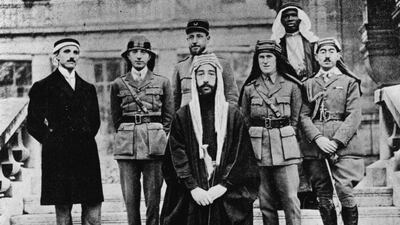This month marked 60 years since the bloody coup d'etat that overthrew Iraq's constitutional monarchy. King Faisal II and his entire immediate family, with the exception of one aunt, were killed in an act that would shape the future of the country for decades to come. The Hashemite monarchy was eliminated in Iraq as military coups were changing the face of the Arab world, in large part influenced by Egypt's Gamal Abdel Nasser. Abdel Karim Qassem's coup was followed by a struggle for power and a series of violent coups leading to the Baath party eventually seizing power.
With the death and destruction that Iraq has witnessed in the past few years and the current protests against state failures, this anniversary has barely made its mark in Iraq. It comes as a time that several Iraqi cities are witnessing demonstrations and calls for a "revolution of the poor". Qassem and his allies tried to sell the coup as a revolution; however, in reality it was a military putsch.
The killing of King Faisal II was an attack on the head of state, the embodiment of Iraq’s sovereignty. The continuity symbolised by the monarchy was overthrown and followed by a bloody history, with a strong president at the heart of the political system.
From 1958 until 2003, the presidency became the most powerful entity in Iraq, with the president in effect holding all executive power, with varying degrees of influence among advisers and ministers according to the character of the president.
After the fall of the dictatorship of Saddam Hussein, there was a concerted effort to weaken the office of the president in an effort to ensure no one person could wield all power in the country. That was an important and welcome change in Iraq. However, what has replaced it is a weakened system, manipulated by various political and military actors. It also led to a near-erasure of the presidency, especially in the last four years.
Over its 37 years of existence, the monarchy was able to represent a unifying symbol for the nation; the head of state held a place above politics. King Faisal II only ruled for five years, coming of age in 1953, and yet he has a fond place in the heart of many Iraqis – including some who were born years after his killing. As time passes, those with adult memories of the monarchy and the progress Iraq was witnessing are dying. And yet that era continues to be seen as a golden age.
Since 2004, Iraq has been governed by a parliamentary system that has proven quite divisive. At the time, the idea was to have separate branches of government act as a counterbalance and ensure proper governance.
In reality, the prime minister’s position as commander-in-chief and leader of the cabinet has become close to being all-powerful. However, article 63 of the Iraqi constitution clearly states "the federal executive power shall consist of the President of the Republic and the Council of Ministers and shall exercise its powers in accordance with the constitution and the law".
According to article 64 of the constitution, "the President of the Republic is the head of the state and a symbol of the unity of the country and represents the sovereignty of the country. He safeguards the commitment to the constitution and the preservation of Iraq's independence, sovereignty, unity, the security of its territories in accordance with the provisions of the constitution".
It is exactly those elements – as a "symbol of unity" representing the "sovereignty of the country" and the preservation of its independence – that Iraq is missing today.
If the presidency was functioning properly and with the right candidate, with the necessary checks of a legislature, cabinet and independent judiciary, it would fill a political void that has plagued Iraq.
The right candidate should be one with domestic and global stature to fill the role of head of state. Yet the choosing of the "right candidate" is being decided according to sect or ethnicity to fill one of the quotas in the power-sharing agreements struck between various political parties. That cannot continue if Iraq is to stabilise. The role of head of state cannot be undercut at such a critical time.
The deep malaise in Iraq has led to speculation about a potential military coup. Senior Iraqi officials for the first time since the disbanding of the army in 2003 have posited this as a possibility.
For a moment, it does not seem like such a bad idea. The Iraqi army proved its professionalism in the battle against ISIS while its leadership showed commitment to protecting the people of Iraq.
Some generals gained hero status among the survivors of ISIS as they liberating towns and cities subjected to the horrors of the terror group. An imposition of law and order is craved throughout the country. Overthrowing a corrupt system seems appealing at first.
But what happens the day after? There are enough armed groups with vested interests in Iraq to ensure years of bloodshed could ensue. Overthrowing a system would still need a new one to replace it – and filling the vacuum of sovereignty and unity would continue to pose a real challenge.
Iraq doesn’t need another coup but it does need a head of state that can look out for its citizens and rise above the messy political infighting playing the country.
________________
Podcast: Beyond the Headlines: Iraq protests threaten long-sought stability


